Sensitivity Training the Hard Way
Today marks the second anniversary of the death of my son Theodore.
He died at home, in my arms, while I tried to resuscitate him. He was probably dead already, but I could not stop until he arrived at the hospital and was declared dead by the emergency physician on duty. Almost twenty years of being a doctor had shown me that some amazing recoveries can occur, and I was not going to let my son go without a fight. It was to no avail.
As an aside, there is a tremendous blessing in being the one who was there when he died. My wife and children were spared the onerous task of trying to revive him; one might say that to person best qualified to take care of him was present. More importantly, I was there to do all that I could, and can never say that things would have been different if I had been there. There is no one who owns the failure to save my son except myself; there is no one I can blame but the man in the mirror.
I write this note to consider some of the things that have struck me over the past two years. Beside the big question of ‘why did my son have to die,’ there are other things which have come to light and made me wonder just how God had been preparing me for the death of my son, and how the death of my son would change - in particular - the way I practice medicine. Theodore’s death has resulted in a lot of revelations that will have repercussions for the rest of our lives, but this note will only discuss those related to my work. Hence the comment about sensitivity training.
1973
I recall an incident back in the Spring of 1973 which was the first time I ever thought about what it would be like to have a mentally retarded child. This happened over in Switzerland, where my family was living for a year. My two older brothers were getting confirmed, and there was no room for my younger brother and I to sit with our parents. We were sitting somewhere in the back of the church, when I noticed this young man who kept staring at us. He was making unintelligible noises and his parents spent a lot of time trying to quiet him. For my brother and I, who had never seen a child with Down Syndrome, it was quite a frightening experience. We moved to another place in the church. Even back then, I wondered what it would be like to take care of such a child. One day I would find out firsthand when we had Theodore.
1985
I was working weekends at the local children’s hospital as what was called a ‘unit supervisor’ while going to college. My job was to oversee the work of the unit clerks on the patient floors in the children’s hospital, the neonatal ICU, and the women’s hospital, as well as keep track of the messengers and patient transporters. It sounds like a lot, but it was not too bad as long as everybody showed up for work. On this particular day, I had responded to a ‘code blue,’ and my responsibility was to make sure that the unit clerk had everything he needed and that any laboratory samples made it to the lab as quickly as possible.
In the room, while a team of physicians worked on the little child, another group of nurses and doctors were trying to get the mother out of the room. She was screaming hysterically and had backed herself into a corner, and ultimately had to be physically removed. This was the first time I had seen a child die, and yet I can barely remember the child. All I can recall is the anguish and pain of the mother as she cried out for the life of her child. My heart went out to her.
July 1991
“Doctor, is my husband going to die?”
Times had changed. I was an intern, assigned to the cardiac ICU in the first month of my internship. I was no longer the medical student who could just sit back and watch how the interns and residents handled these kinds of questions. Now I was it. I was not an attending, but for this family, I was the doctor they would see most of all while their loved one was in the ICU. I was the last word on a lot of things, so I can only credit it to the grace of God when I did not say the first thing that came to mind when asked the above question. I was rather tired and was developing a cynical attitude about medicine, and it was only the first month after becoming an M.D. So, rather than saying, ‘we are all going to die someday, ma’am,’ I gave her some more reasonable answer which I can’t recall. It was not the first time that I benefited from keeping my mouth shut for a few seconds before answering a question.
Summer, 1995
My flight suit was soaked with sweat, and I felt really tired as I walked into the conference room set aside for the family. I was a resident now, but today I was moonlighting as a flight physician, the doctor in the back of the helicopter which would drop out of the sky and take patients away from the small, backwoods hospital and land them in the all-powerful university hospital – complete with trauma and cardiac care.
The family had seen us arrive, and they looked at me with eager expectation. What I had to say would not go over well, because I had failed to do what the emergency room (E.R.) team had already attempted. The wounds were too serious for this patient, and every intervention I could think of had already been tried. As one of the technicians continued CPR, I went ahead and did all that I could, to no avail. After reviewing the case with the emergency physician, and finding nothing else to do, we ended the code. As I spoke to the family, I made a point to mention that the E.R. team had already given excellent care to the patient, but that nothing could be done, and their loved one had expired.
All was silent for a moment, as if a punch line from a joke had been said incorrectly. The family could not comprehend what I had just said, but when it did, they totally lost it. There was not much more I could say. I mumbled my condolences and left.
It was the quietest helicopter ride home ever.
Summer 1999
In the Advanced Traumatic Life Support (ATLS) course I took in the mid-90’s, there was a saying, “pulseless blunt trauma equals death.” That’s what this patient, a young woman, in the emergency room looked like, until someone dragged a Doppler ultrasound machine out of a cabinet and swore they heard a pulse. At that point, the patient was rushed upstairs so fast that they left the surgeon and the anesthesiologist behind. I was the attending anesthesiologist, doing my time in the Air Force at this trauma center. We went to work trying to save the life of this girl.
The surgeon found a belly full of blood, which continued to fill up as fast as we could push it into her. After working for a long time, we realized her injuries were too great to repair, and ended the resuscitation.
The surgeon and I went together to talk to the family. What I saw next was the worst way to break the news to a family that their daughter was dead. As we approached the family, the surgeon asked me what the name of the patient was. It took me a moment, but I recalled hearing someone say her name was ‘Ann.’
I also observed that the large group of people in the hallway ahead of us was standing right in front of my office door.
The surgeon stepped up and addressed the crowd, “Who is Ann’s mother?”
“I am.” This from a short, stocky woman trying to wipe tears from her eyes.
“Ann is dead.”
He might as well have thrown a grenade at these people. In a moment, most of the people were rolling on the ground, wailing and crying and holding onto one another. From out of nowhere, a chaplain and security guards materialized and began to assist the people back into the conference room they had been in. The outpouring of grief was overwhelming. I pushed my way to the mother. Her husband was holding her; both of them were weeping. I took her hand and introduced myself. I have no idea if she could hear me. I told her something that I had started to tell people in this situation; I told her that her daughter had not suffered any pain as she died. I knew this to be true, because her brain had not been receiving any perfusion for quite a while as we tried to save her life. It was all I could tell her, and I felt as if I were going to cry as well. I had never been in her shoes before, but I could imagine – or so I thought.
I left, but there were still a few people huddled in front of my office door. I walked off to sit in the resident’s lounge instead.
June 2007
I am not sure why our friends asked us to come and see them, but there was no way we would refuse. I had been working in the yard, and with hours of sunlight left, I hoped to have it all complete on that Saturday in June. All those plans changed when we got the call. Our friend had given birth to a child with a known lethal birth defect, and as expected, the child only lived for an hour before dying. The child had been baptized, and now the family asked if Carolyn and I would come and stay with them for a while. We went to see them. It was a bittersweet time, knowing that their child was in Heaven, but also mourning the loss of a child. I know I did not say anything worth repeating while I was there, but just being there seemed to be what mattered most.
I shall always look upon this experience as a privilege. I think that it was a gift from God, something given to us to prepare us for what was to come.
March 2008
I was on a retreat, staying in a lodge in Oklahoma. There were not enough rooms for the attendees, so I was one of many who slept on the floor of the living room. This living room had the biggest fireplace I had ever seen, and we kept a fire going in it all the time, because it provided the heat for most of the house.
One disadvantage of sleeping in the living room during a retreat is that some folks like to stay up late and talk, so I found myself going to bed late every night I was there. I was not the last one to sleep, though. I noticed one man who would sit by the fire every night, just staring into it. Sometimes one of his sons would sit with him, but they never talked. When I woke in the morning, he would still be there, staring into the fire. I found out later that this man had lost a son about a year before in an accident. I wondered – God forgive me – what it must be like to lose a child.
April 2008
I found out what it must be like to lose a child less than a month later. Since that time, I have discovered that there are a lot of men and women out there who have also lost children; I discovered this when they would come up to us and express their sorrow and condolences to us. Being on the receiving rather than the giving end of things showed me how important even a few kind words, or even a hug – and I don’t like hugging people – is to those who mourn.
In the time since Theodore’s death I have had the opportunity to reach out to those who mourn, hopefully in a better way. I hope the flip response I almost said to the woman whose husband was dying never occurs to me again. In the past year I have had the opportunity to baptize a dying infant and to talk to an inconsolable woman who stated ‘there is no God’ upon learning that her son was dying. I also had the chance to say to a man who had just lost his son, “I cannot take away your pain, but I know what you are going through, and I am truly sorry for your loss.” I don’t know if I would have been able to say these things to those families if I had not had the experience of losing my son Theodore.







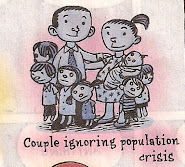
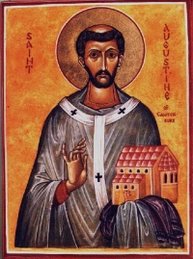




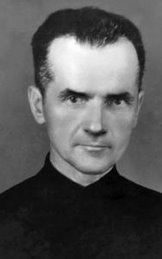

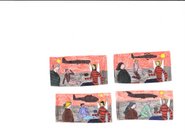
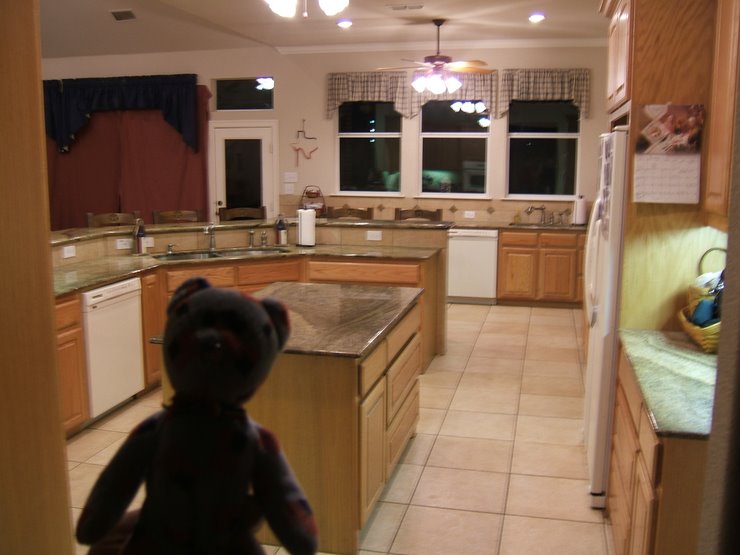

8 comments:
We are thinking of you all today, and missing Theodorable greatly. Give everyone My love . Aunt Linda
My sincerest condolances to you all.
Thanks for sharing these personal and moving testimonies
God bless
xxx
My Our Lady of Compassion, Our Mother of Sorrows, who understands the pain of loss comfort you with Her maternal love. May God bless you all and give you countless graces this Easter.
God bless you.
We are sorry for your loss at this anniversary. What a tribute to life you witness, and what a blessing to see you at the Bishops' pro-life dinner. Thank you & your family for your support! Who was that beautiful new life at your table? Splendor! God Bless You all!
Thanks, timh. Sadly, that new little one is not one of ours. Very cute, though....
By the way, who are you? We can only think of one Tim we know, and we were admiring his painting last night. Is that you?
God bless!
I have three sons and your words show so much depth and compassion. I am very sorry for your loss. He is a beautiful boy.
Dear Doctor,
My prayers are with you and your entire family tonight, especially your boy.
We watched a good documentary tonight called "The Human Experience." I think you would enjoy it, your story made me think of how fragile life can be and how life is still beautiful even with pain.
Pax,
Post a Comment